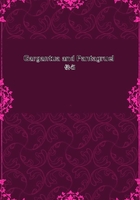
第259章
Nor would I have attempted such a task, but that I was ambitious of giving a view of the most valuable work of the greatest genius of his age, to the Mecaenas and best genius of this. For I am not overfond of so ungrateful a task as translating, and would rejoice to see less versions and more originals; so the latter were not as bad as many of the first are, through want of encouragement. Some indeed have deservedly gained esteem by translating; yet not many condescend to translate, but such as cannot invent; though to do the first well requires often as much genius as to do the latter.
I wish, reader, thou mayest be as willing to do my author justice, as Ihave strove to do him right. Yet, if thou art a brother of the quill, it is ten to one thou art too much in love with thy own dear productions to admire those of one of thy trade. However, I know three or four who have not such a mighty opinion of themselves; but I'll not name them, lest Ishould be obliged to place myself among them. If thou art one of those who, though they never write, criticise everyone that does; avaunt!--Thou art a professed enemy of mankind and of thyself, who wilt never be pleased nor let anybody be so, and knowest no better way to fame than by striving to lessen that of others; though wouldst thou write thou mightst be soon known, even by the butterwomen, and fly through the world in bandboxes. If thou art of the dissembling tribe, it is thy office to rail at those books which thou huggest in a corner. If thou art one of those eavesdroppers, who would have their moroseness be counted gravity, thou wilt condemn a mirth which thou art past relishing; and I know no other way to quit the score than by writing (as like enough I may) something as dull, or duller than thyself, if possible. If thou art one of those critics in dressing, those extempores of fortune, who, having lost a relation and got an estate, in an instant set up for wit and every extravagance, thou'lt either praise or discommend this book, according to the dictates of some less foolish than thyself, perhaps of one of those who, being lodged at the sign of the box and dice, will know better things than to recommend to thee a work which bids thee beware of his tricks. This book might teach thee to leave thy follies; but some will say it does not signify much to some fools whether they are so or not; for when was there a fool that thought himself one? If thou art one of those who would put themselves upon us for learned men in Greek and Hebrew, yet are mere blockheads in English, and patch together old pieces of the ancients to get themselves clothes out of them, thou art too severely mauled in this work to like it. Who then will? some will cry. Nay, besides these, many societies that make a great figure in the world are reflected on in this book; which caused Rabelais to study to be dark, and even bedaub it with many loose expressions, that he might not be thought to have any other design than to droll; in a manner bewraying his book that his enemies might not bite it. Truly, though now the riddle is expounded, I would advise those who read it not to reflect on the author, lest he be thought to have been beforehand with them, and they be ranked among those who have nothing to show for their honesty but their money, nothing for their religion but their dissembling, or a fat benefice, nothing for their wit but their dressing, for their nobility but their title, for their gentility but their sword, for their courage but their huffing, for their preferment but their assurance, for their learning but their degrees, or for their gravity but their wrinkles or dulness. They had better laugh at one another here, as it is the custom of the world.